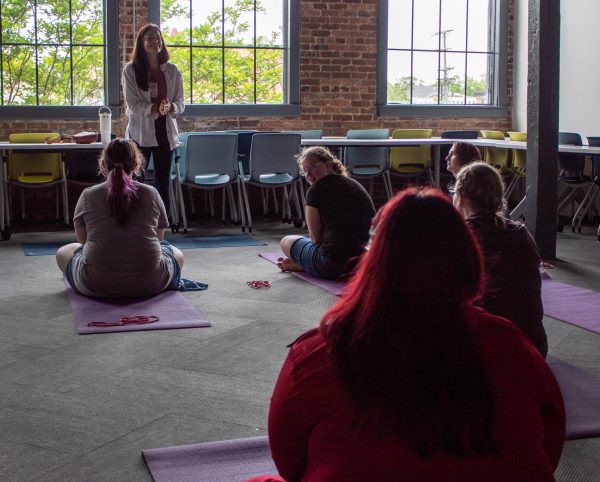SRC welcomes students back with precaution
September 18, 2020
Students that are returning to campus this semester will not find it hard to miss the many visible changes COVID-19 has evoked to life here at the University of North Alabama.
One of those changes being the limited amount of activities and services available to students. One resource that is up and running is the Student Rec Center (SRC), equipped with new safety precautions.
The SRC’s new health and safety requirements are aligned with the UNA’s overall policy regarding COVID.
“Staff must wear a face covering at all times,” Glenda Richey, the Director of the Student Recreation Center said. “Water fountain lip dispensers are not operable. No more than one patron per half-court of the gymnasium. Badminton and table tennis will be limited to singles.”
Additionally, the number of patrons will be limited in the gymnasium, the cardio room, and the fitness center and some equipment will be modified to comply with social distancing.
Along with limiting numbers, a temperature check is required for entrance into the SRC and the Centers for Disease Control and Prevention (CDC) recommended disinfectants are being utilized.
“Any patron with a temperature greater than 100.4 will not be allowed to enter,” said Richey. “The SRC will temporarily close one area at a time twice a day for 30 minutes for COVID-19 disinfecting.”
While the requirements of the staff of the SRC are relatively involved, what is required of the patrons is simple: wear a mask, bring your MANE card, undergo a temperature check and enjoy working out.
Group workout classes are also offered in the SRC and are being adapted as well.
Courtney Dunn, a Zumba instructor at UNA, speaks to the changes in protocol for her class.
“I have to get COVID tested as an instructor, just like every other student at UNA,” Dunn said. “I have to end class early so I can spray down the classroom to disinfect it. I wear a mask up until I start teaching. Same goes for the people taking the class.”
One more difference is that instructors cannot have fans on in the room, which to Dunn, is not ideal.
As far as noticing a decline in interest for Zumba classes, Dunn said she has actually noticed an incline in participants.
“I think since we don’t require masks during the workout, people will come because it’s one place on campus you don’t have to wear a mask all the time,” said Dunn.
Since patrons are not required to wear a mask in workout classes, they must remain six feet apart. However, Dunn doesn’t believe this exception to the mask mandate both on campus and the mandate outlined for the SRC will affect the amount of COVID-19 cases.
“Since the fans are off and there are “x’s” on the floor, I don’t think it would increase the spread of COVID. The “x’s” are six feet apart so they definitely ensure safety in that aspect,” Dunn said.
Similarly to group workout classes, intramural sports have also been affected by the virus. Luke Pershall, the Intramural Coordinator, speaks to the changes.
“Intramural sports will take a hit because of COVID-19,” Pershall said. “We will not be able to play flag football, which is our most popular sport in the fall.”
Last year, there were more than 350 participants playing flag football. Due to the virus, the SRC did not feel comfortable with allowing students to engage in activities where players are in contact with one another for the entire game.
Pershall added that the SRC will only offer sports that allow participants to distance as much as possible.
Additionally, the requirements of the intramural participants are similar to those of the SRC.
“In keeping with our SRC policies, every participant must pass a temperature check and wear a face covering if they cannot maintain six feet between participants while not playing,” added Pershall.
The intramural sports available this semester will be sand volleyball and softball, as they are both sports that allow for the competing teams to be separated during the game. The equipment will also be sanitized and divided between each team so that no equipment will have to be handled by both teams.
Even with all of the limiting requirements, Pershall is hopeful that intramural sports won’t take a hit in interest.
“We are in the registration process for our first sport, sand volleyball, right now,” Pershall said. “We are hoping that, with limited offerings on campus, to be one of the only sources of continual recreation and entertainment.”
The SRC wants students to know that they have their health and safety in mind with the programs they are offering. They hope their numbers will stay relatively stable with not much else going on around campus.
The SRC health and safety requirements are similar to that of the precautions the entire campus has taken to keep students safe, apart from a few rules. Although partaking in any group activity increases a person’s risk of contracting COVID-19, Glenda Richey explains that to her, the benefits outway the risks.
“Group exercise is the preferred form of working out for many people – myself included,” Richey said. “Classes promote accountability and comradery, push students to work out harder, and are motivational and fun.”
For many, exercise is a stress-reliever, it boosts self-esteem, improves sleep, increases energy levels and reduces the effects anxiety and depression. All of these are issues that many are facing during this pandemic.
As with everything that has been forced to change the semester, the SRC’s new requirements are all a part of what is our “new normal” for campus life.










